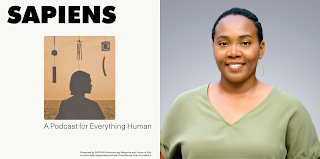When film director Steven Spielberg decided to make a movie about an archaeologist, he knew he had a problem. Other than archaeologists, no one would care about such a movie. So Spielberg added a vibe-y name, a pinch-front fedora hat, an aversion for snakes, and a bullwhip. Suddenly, Indiana Jones become an iconic movie symbol that has attracted fans from around the world.
Now, anthropologists have a similar problem. This is a job description for an anthropologist: "Anthropologists study everything about being human. Their work explores our origins as a species, our present-day cultures, and how humanity will survive into the future. Anthropology takes a holistic approach to humans as social animals."
That description does not exactly encourage people to give up their Taylor Swift tickets to listen to an anthropologist.
Anthropologists, however, have a not-so-secret weapon. It is the podcast SAPIENS, which has made studying our favorite topic -- us -- cool, interesting, and utterly fascinating.
In fact, there's a new season of SAPIENS
that speaks with anthropologists from around the globe to help us
uncover what makes us human. For its fifth season, listeners will hear a
range of human stories: from the origins of the chili pepper to how
prosecutors decide someone is a criminal to stolen skulls from Iceland.
With
Eshe Lewis, a cultural anthropologist, in the hosting chair and Chip
Colwell as the executive producer, the throughline of this season is the
way in which humans use cultural beliefs and practices not only to
explain the past, but also to imagine the present and future.
For example, in the very first episode of the new season titled "Prime Harvest," SAPIENS -- via reporter Adam Netzer Zimmerman -- examines the practice of collecting Icelandic human skulls for study. Is that even legal? What should happen to those skulls after a century of studying them?
In the latest episode on April 18th, SAPIENS discusses paleoethnobotany, a field of study that examines plant remains to understand their connection to humans. I know what you're thinking. Snoozefest. But the episode heats up when archaeologist Katie Chiou discusses chili peppers. And, no, they don't make a pit stop at Taco Bell.
In 2016, SAPIENS launched a digital magazine about everything human, told through the stories of anthropologists.
In August 2018, SAPIENS, the podcast, began. Its first episode was about DNA and the murky, interconnected issues of identity and heredity.
As people
who study other people, anthropologists look to the past, present, and
future to assemble vital observations on what it means to be human. This
work matters. Yet all too often their research remains inaccessible to
public audiences.
Their stated purpose is to amplify anthropological insights to make a difference in how people see themselves and those around them.
In one episode you might learn about Neanderthals who created art or about a tribe in Peru that invented its own sign language. In another episode, you might question whether humans are naturally generous, or read an interview with an anthropologist working to combat anti-Black racism in Brazil.
SAPIENS covers humankind’s labyrinthine relationships with politics, power, food, art, animals, race, nature, sex, sports, violence, technology, morality, and much more.
SAPIENS is a production of the Wenner-Gren Foundation and part of the American Anthropological Association Library.
To listen to SAPIENS, you will not need a hat, bullwhip, or a cool name. Just a natural curiosity for what makes us human and how our past affects our future.
But if it makes you more motivated to listen to SAPIENS, we will call you Nevada Smith. Yes, you can wear a cool hat. The hat will complement your earbuds.
But absolutely "No bullwhip."

Comments
Post a Comment
Thank You for your input and feedback. If you requested a response, we will do so as soon as possible.